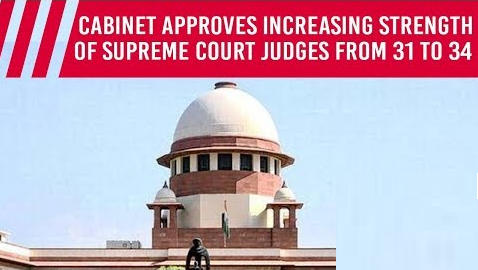Table of Contents

- In June, Gogoi, in his letter to Modi, had said more judges were needed in the Supreme Court for it to run more efficiently and effectively.
- He had mentioned there are 58,669 cases pending in the apex court.
- As of July 1, that number is up to 59,695.

CONSTITUTIONAL BENCH
- Gogoi had said he was unable to set-up five-judge Constitution benches for substantial questions of law as to the interpretation of the Constitution because of inadequate judge strength.
- As of July 1, the total number of cases pending before Constitution benches are 557, with 407 before five-judge bench, 13 before a seven-judge bench, and 137 matters before the nine-judge constitutional bench.
PRESENT STRENGTH OF SC & HC JUDGES
- After three judges were appointed to the Supreme Court in May, the court is functioning at its full strength of 31 judges — the first time since 2008.
- The judge strength in high courts was increased by 173 judges, from 906 to 1079 in 2016.
CONSTITUTIONAL PROVISION- APPOINTMENT

HISTORY OF NUMBER OF SC JUDGES
- The maximum number of Judges of the Supreme Court which under article 124 (1) of the Constitution was fixed at seven, excluding the Chief Justice.
- It was raised to 10 by the Supreme Court (Number of Judges) Act, 1956.
- This number was subsequently raised to 13 by the Supreme Court (Number of Judges) Amendment Act. 1960.
- Further the number was increased to 17 in 1977.
- However, the number was restricted to 15 judges by the till the end of 1979. But it was withdrawn at the request of the Chief Justice of India.
- In 1986, the strength of the top court was increased to 25, excluding the CJI.
- Subsequently, the Supreme Court (Number of Judges) Amendment Act, 2009 further augmented the strength of the court from 25 to 30.

REFORMS- WAY FORWARD
- Limiting reasonable grounds for adjournments. Shifting hearing dates repeatedly causes delay.
- Introducing modern methods and technology can also solve delays to a large extent. 50% of judicial delay is due to non-service of summons.
Increasing work hours
- The Supreme Court works for 193 days, high courts 210 days and trial courts 245 days a year.
- In contrast, in the United States, courts never close for summer break, just as in some European countries, such as France.
- The Supreme Court of Canada goes on vacation for just 11 days. In Britain, the court closes for 24 days in a year.
INTERESTING FACTS
- On the 28th of January, 1950, two days after India became a Sovereign Democratic Republic, the Supreme Court came into being.
- After its inauguration, the Supreme Court commenced its sittings in a part of the Parliament House.
- The Court moved into the present building in 1958.
- The proceedings of the Supreme Court are conducted in English only.
Latest Burning Issues | Free PDF























 WhatsApp
WhatsApp